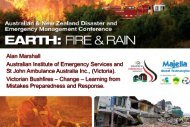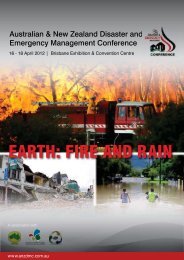Book of Abstracts 2013 - Australian and New Zealand Disaster ...
Book of Abstracts 2013 - Australian and New Zealand Disaster ...
Book of Abstracts 2013 - Australian and New Zealand Disaster ...
Create successful ePaper yourself
Turn your PDF publications into a flip-book with our unique Google optimized e-Paper software.
Mr Mark Armstrong<br />
Director, Full Capacity<br />
Co Author - Mr Don Quinn, Associate, Full Capacity<br />
Beyond recovery …………. Reconstruction as the ‘fifth phase’ <strong>of</strong> disaster management<br />
The PPRR (Prevention Preparedness Response Recovery) model has been a widely accepted model for emergency<br />
management planning in <strong>Australian</strong> in recent decades. Yet the political <strong>and</strong> policy legacies <strong>of</strong> recent major disaster<br />
events suggest that PPRR is not as ‘comprehensive’ as it is <strong>of</strong>ten described. An analysis <strong>of</strong> practice suggests that there is<br />
actually a distinct ‘fifth phase’, commonly called reconstruction. Cyclone Larry, The Victorian Bushfires <strong>of</strong> 2009, the<br />
Queensl<strong>and</strong> flood <strong>and</strong> weather events <strong>of</strong> 2010/11 <strong>and</strong> <strong>2013</strong> all saw extensive post-recovery activities undertaken by<br />
specially formed authorities. These bodies all had roles not defined in State <strong>Disaster</strong> Management Arrangements <strong>and</strong><br />
they had to be integrated within the normal machinery <strong>of</strong> government to achieve their purposes. They conducted a<br />
range <strong>of</strong> activities including coordinating NDRRA funding submissions, making recommendations for medium term<br />
mitigation measures <strong>and</strong> coordinating the management <strong>of</strong> donations. These Authorities, whilst successful, all formed<br />
from scratch, in the midst <strong>of</strong> crisis, without an existing legislative or conceptual framework to guide activity <strong>and</strong><br />
facilitate integration. This situation, underst<strong>and</strong>ably, resulted in missed opportunities, friction amongst participating<br />
agencies, bureaucratic inertia <strong>and</strong> ad-hoc arrangements. These experiences suggest that there is an opportunity to<br />
anticipate <strong>and</strong> plan for reconstruction activities as part <strong>of</strong> a truly comprehensive approach. In doing so, there is an<br />
opportunity to bring together two groups <strong>of</strong> pr<strong>of</strong>essionals to collaborate more: emergency planners <strong>and</strong> emergency<br />
managers. The latter develop their own emergency operations plans, which are in the vast majority <strong>of</strong> cases focused<br />
almost exclusively on immediate response <strong>and</strong> recovery functions following a disaster. Moreover, the discussion<br />
between planners <strong>and</strong> emergency managers, particularly if augmented by environmental <strong>and</strong> sustainable development<br />
perspectives, could open up new opportunities <strong>and</strong> approaches for post-disaster betterment. This paper will seek to<br />
summarise the important common themes from the post-recovery activities in recent <strong>Australian</strong> disasters <strong>and</strong> then<br />
provide a conceptual policy <strong>and</strong> organisational framework for a fifth, ‘reconstruction’, phase.<br />
Ms Amara Bains<br />
Director, Strategy & Operations, QLD Alliance for Mental Health Inc.<br />
Co Author - Ms Joanne Durham, Lecturer, Aust Centre for Tropical <strong>and</strong> International Health<br />
Community based organisations: developing organisational resilience to build back better<br />
Most community disaster management plans include reference to an important role for community based organisations<br />
(CBOs), yet there is little published information about how resilient these organisations are - an essential capability<br />
that enables them to participate in meeting community needs during both acute <strong>and</strong> recovery phases. The advantage <strong>of</strong><br />
CBOs, <strong>of</strong> being community-based, is also their vulnerability, as in all likelihood they too are affected by the disaster.<br />
While organisational resilience is <strong>of</strong>ten used synonymously with business continuity, for these groups working at grassroots<br />
level, organisational resilience goes beyond business continuity. It includes the ability for an organisation to<br />
continue its day-to-day business <strong>and</strong> meet a surge in the dem<strong>and</strong> for services it may not normally provide, as well as<br />
the ability stay connected to the community so that it remains a viable entity within the community for building<br />
resilience. Therefore, organisational resilience in this context refers to CBO’s capacity to adapt to the needs postdisaster<br />
<strong>and</strong> manage its own organisational transformation post-disaster in order to ‘“build back better’” <strong>and</strong> preserve<br />
its role in building <strong>and</strong> promoting community resilience. Despite the crucial role CBOs play in all stages <strong>of</strong> the disaster<br />
management process, there is limited underst<strong>and</strong>ing <strong>of</strong> how to evaluate <strong>and</strong> develop CBOs’ resilience. The purpose <strong>of</strong><br />
this paper is to begin to address this crucial gap in the literature. Drawing on <strong>Australian</strong> <strong>and</strong> <strong>New</strong> Zeal<strong>and</strong> published<br />
research <strong>and</strong> a comprehensive literature review followed by a qualitative analysis <strong>of</strong> the literature <strong>and</strong> the authors’<br />
experience in Indonesia, Cambodia <strong>and</strong> south Sudan, this paper uses a systems approach to analyse CBO resilience. We






